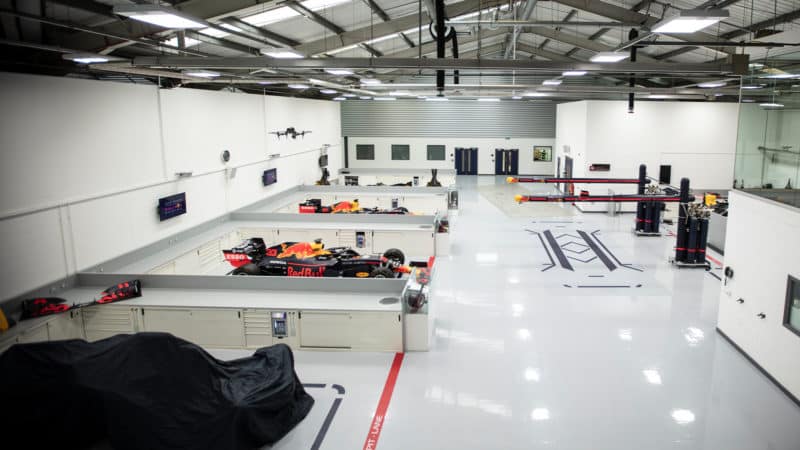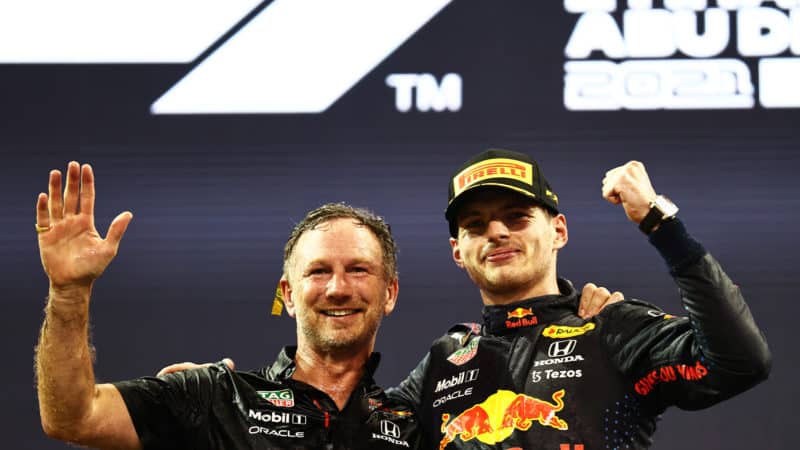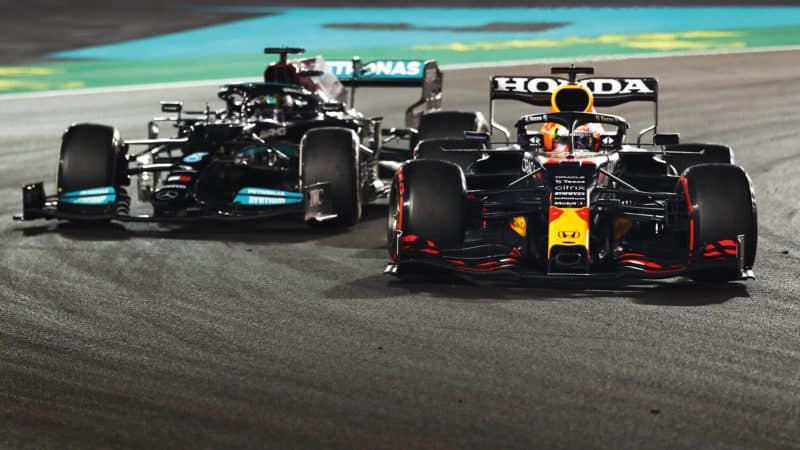It was over a month ago that some team bosses were led to believe, quite why we don’t know, that Red Bull had overspent by some margin, and that there was potentially also a less significant “procedural” issue concerning Aston Martin, which said that it was surprised at the suggestion.
The key number in the financial regs is 5%, or around $7m (£6.2m) in terms of the 2021 cost cap of just over $140m (£123.5m). If you go over the cap by less than 5%, it’s a “minor” breach, with a certain list of penalties. Over 5% is a “material” breach, with much tougher potential sanctions, which extend to exclusion from the championship.
Those most concerned about an RBR breach are obviously Toto Wolff of Mercedes and Mattia Binotto of Ferrari, whose drivers battled with Verstappen for the 2021 and 2022 titles respectively. They had been discussing the matter for some weeks before it hit the public domain over the Singapore weekend.
Breaking the cost cap can bring “serious” performance
Make no mistake, if RBR is found guilty it will be a huge call for the FIA to make on what happens next. Rivals have made clear that Red Bull would have gained not just in 2021, but also heading into this year and beyond.
And that doesn’t even take into consideration the 2022 numbers. If RBR adopted certain interpretations for last season we can assume they did the same this year, and it may well already be too late for the team to get within this year’s lower cost cap.
So why is this issue so important? Simply because every pound or dollar spent over the limit will potentially have made the Red Bull quicker on track given that the overall restriction strikes at the very heart of performance development.
“We made people redundant but two teams were aggressively hiring, offering unbelievable benefits”
“We take it very seriously, because this is a serious amount of lap time,” said Ferrari sporting director Laurent Mekies. “Seven million will be like 70 engineers. Seventy engineers, they will give you a serious amount of lap time. That’s one example.
“So, if you think about the power that these regulations have, these financial regulations have, it’s probably overpowering both the technical and sporting regulations at the same time, if you think about the amount of lap time that is lying into those sort of numbers. So this is why we are very much looking forward to a transparent and severe approach.”
“Any spend above the margin is spent on performance,” said Alpine’s Otmar Szafnauer.
“And once you start spending on performance where others don’t get a chance to, because they’ve actually stuck to the budget cap, that’s serious.
“And I think the FIA have to appropriately punish those who have gone over. You have to first understand how big the breach was, and then what an appropriate penalty is.”
Cost cap is being constantly monitored
If as some suggest Red Bull is trying to exploit loopholes it will be unusual to say the least, given how much effort has gone into making the cap work. Every aspect of it has been discussed for years, and the CFOs of the 10 teams are in regular contact with the FIA’s financial experts.
“We have been discussing non-stop with the FIA for two years,” says Mekies. “It was a new regulation, we have pretty much the FIA living with us in our factories, going back and forth with questions, clarifications every week.
“So, I think it’s not the approach of trying to find a loophole and exploiting it and hoping that nobody finds out about it. It’s about whenever there are questions, we will ask the FIA, as will every team, and they will give an answer.
“And that’s how we have moved forward. This is why it’s key now that we do not move the goalposts of what is allowed and what is not allowed. And this is why it is said whatever has happened, we are looking at it in the light of the regulations as they are written today.”

McLaren made cutbacks to meet cost cap, but can’t understand how rivals were recruiting
Those teams who had to make sacrifices are keen to get full clarity from the FIA on their rivals’ spending — particularly when it comes to Aston Martin and Red Bull.
“The introduction of the cost cap meant we had to put some really serious measures in place, which were affecting our people,” said McLaren’s Andreas Seidl.
“We had to make people redundant as well, we had to ask our people to accept pay cuts or pay freezes, which was very, very serious. And at the same time, there was, especially from two teams, an incredible aggressive hiring, still ongoing, throwing incredible salaries on the table, offering unbelievable, let’s say, company benefit packages, where we’re all wondering how this is possible in this new world of F1, and our people are obviously challenging us if we do everything right on our side.
“And that’s why we simply welcome clarity on this. Because in the end, we will find out by that also if maybe we have missed something on our side, or if there actually were breaches ongoing and we have a clear explanation why certain teams can do certain things, which we were simply not in a position to offer to our people.”
Penalties for cost cap breaches are still unknown
The unusual aspect of the financial regulations is that there is a menu of penalties, and we don’t know exactly what might be imposed. No one seriously expects that at this stage Verstappen will lose his 2021 drivers’ title, but that aside, anything else is possible.
Some fans have suggested that it may give the FIA the chance to fudge the issue with a light penalty.
The other way to look at it is not knowing how big the punishment is should be a deterrent. If you know that X million over the cap means you lose 10 constructors’ points, then it might be worth spending that money on something that you are confident will gain you 30 points, and so on.
“Wednesday’s announcement is a test of the cost cap. If we don’t pass, it’s probably game over”
“If it turns out to be something that a team can bet on in order to gain a competitive advantage then the whole system collapses,” says Mekies. “And this is why, especially in the framework of the very first instance of the budget cap being challenged, you need that amount of severity.”
The crucial thing is that whatever comes out on Wednesday, the integrity of the cost cap has to be maintained – love it or loathe it, it is absolutely fundamental to the future of the sport.
“It is a very vital test for the cost cap,” said Mekies. “And if we don’t pass that test, it’s probably game over, because the implications are huge.
“Should we talk about penalties now? Probably not. I know, it’s probably what the people in the grandstands want to see and we respect that. But in fact, we are, we are much earlier in the process than that, and probably an even more key aspect of it, is there a breach? Do we agree on the entity of the breach and that, as a result, confirm the rule everybody is obeying?
“So, I think what is very much crucial now is that the FIA fully enforce rules as they are written now. And then after the penalties are a different matter.”

Suspicions loom over Red Bull, but the team says it’s unaware of cost cap concerns
Red Bull
“We knew from the beginning when we voted for the cost cap that it will be difficult,” said Alfa’s Fred Vasseur. “First to put in place for the big teams and then to police it.
“But now we took the decision, and we have to go for it. There is no way back and we can’t stop it. I mean that for sure it was a huge amount of work, probably much more for the big teams than for us, and I think also we have to consider the huge amount of work done by the FIA to inspect all the teams.”
“For us it’s very simple, Dorilton wouldn’t have entered the sport if the cost cap wouldn’t have been in place,” said Williams boss Jost Capito. “So that shows how much that means for the team.
“I think I have no meeting where the word cost cap is not mentioned. And this is for every technical meeting, every financial meeting, everything. So it goes into every single area and that makes it highly complex.
“The number of calls and emails from our financial director with the FIA to clarify things, it’s a massive burden for the financial team. But we are committed to do that and to fulfil the cost cap.”



